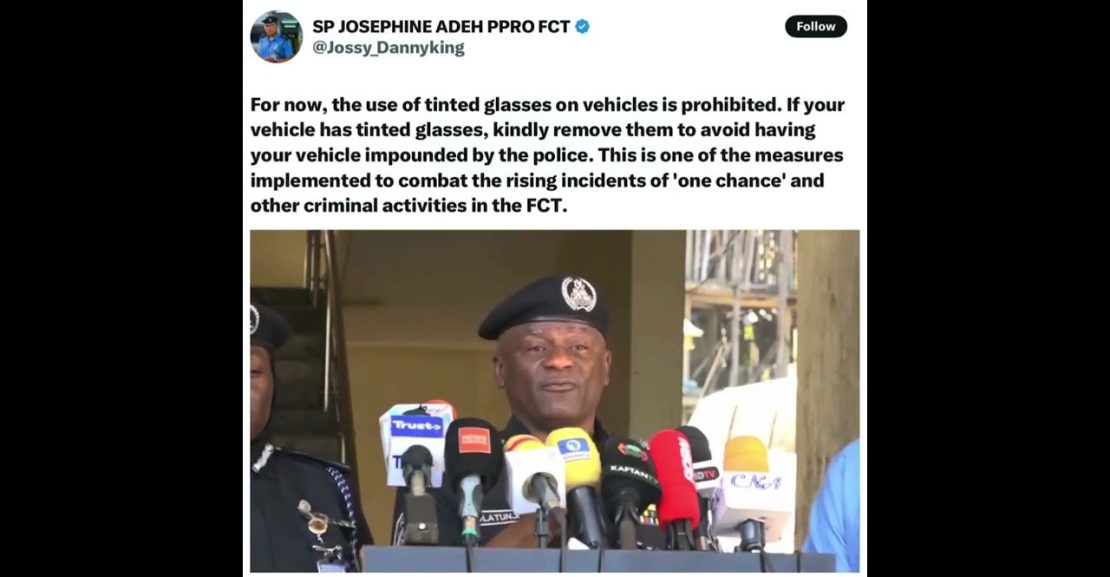
In recent months, one of the most debated topics in Abuja, Nigeria’s Federal Capital Territory, has been the ban on tinted windows for vehicles. This move, introduced by the Nigerian Police and other law enforcement agencies, aims to enhance security in the city, which has faced an uptick in criminal activities such as kidnappings, armed robberies, and other violent crimes. While the government asserts that this ban is crucial for public safety, the policy has sparked a wave of mixed reactions from citizens, car owners, and businesses alike. Is the ban on tinted cars in Abuja a necessary measure for ensuring security, or does it infringe upon the rights and freedoms of ordinary Nigerians?
Why the Ban on Tinted Windows?

The ban was introduced as a measure to curb criminal activities in the capital. The Nigerian Police argue that vehicles with tinted windows make it harder for security personnel to identify the occupants of a car. Criminals are believed to exploit this to carry out illicit activities, such as transporting stolen goods, engaging in kidnappings, or conducting other unlawful operations without being easily detected.
The Police also claim that the lack of visibility into the interior of vehicles hinders law enforcement’s ability to quickly assess situations, especially when there are security concerns in busy areas. The ultimate goal is to prevent criminals from using tinted windows as a cover for nefarious activities, making it easier for authorities to ensure safety in the city.
Enforcement: How the Law Is Being Applied

The enforcement of the tinted glass ban has been fairly strict, with roadblocks and surprise checks conducted by the police, Federal Road Safety Corps (FRSC), and other security agencies. Vehicles found with unauthorized tinted windows are subject to fines, and in some cases, the cars are impounded. The law also makes exceptions for certain categories of vehicles, such as those belonging to high-ranking government officials, diplomats, or individuals with special clearance from the authorities.
However, the manner of enforcement has raised questions. Many Nigerians believe that the implementation of the law is inconsistent, with some individuals being allowed to keep their tinted windows after paying bribes or receiving special treatment, while others face penalties despite meeting similar conditions. This has led to concerns about fairness and transparency in the enforcement process.
Public Reaction: Divided Opinions
The ban has sparked divided opinions among Abuja residents. On one hand, many support the idea of improving security, especially given the rising concerns about kidnappings and violent crimes in the capital. For those who have experienced or know someone affected by these crimes, the idea of making it harder for criminals to conceal themselves in vehicles is seen as a step in the right direction.
On the other hand, a significant portion of the population views the ban as an unnecessary overreach. For many residents, tinted windows are not just a matter of privacy—they are also a necessity. The hot, sunny climate of Abuja makes tinted windows a desirable feature, offering shade and reducing the intense heat inside vehicles. For others, tinted windows provide a sense of security and privacy, particularly for those who may be concerned about personal safety in a city with a large number of people.
Critics of the ban argue that it penalizes ordinary citizens who have no involvement in criminal activities. They contend that the government should focus more on improving law enforcement techniques, surveillance systems, and intelligence gathering rather than imposing a blanket restriction that affects everyone.
The Economic Impact
For the automotive industry, the ban on tinted cars in Abuja tinted represents a significant economic blow. Car owners who have already installed tinted windows on their vehicles are now faced with the costly option of removing or replacing them to comply with the law. Businesses that specialize in window tinting, including auto shops and car dealerships, are also feeling the impact as demand for tinted window installations has dropped dramatically.
Additionally, some vehicle owners may face fines if they fail to comply with the law, further straining their finances. This economic strain could disproportionately affect the middle class, who might have already invested in vehicles with tinted windows for comfort or security.
Privacy Concerns and Human Rights
One of the more pressing concerns regarding the ban on tinted cars in Abuja is its potential impact on privacy rights. In a society where personal security is a growing concern, many feel that the ability to have tinted windows is a reasonable means of protecting one’s privacy. By removing the option of tinting, critics argue, the government may be infringing on the rights of individuals to enjoy privacy and security in their personal space.
Furthermore, some vehicle owners, especially those with medical conditions or other needs, may argue that tinted windows are not just a luxury but a necessity for their well-being. For these individuals, the ban could be seen as an unwarranted restriction on personal freedom.
A Question of Effectiveness
While the ban on tinted cars in Abuja may seem like a straightforward solution to security problems, many are questioning its overall effectiveness. Criminals, they argue, will always find ways to circumvent the law, whether by using different methods of concealment or simply taking their activities elsewhere. Some have suggested that the government should focus on enhancing law enforcement capabilities, such as improving police training, surveillance technologies, and intelligence gathering, to tackle crime more effectively.
Moving Forward: Balancing Security and Rights
The ban on tinted windows in Abuja raises important questions about how to balance security needs with the rights of individuals. While it is clear that Nigeria is grappling with a serious security crisis, many Nigerians feel that the government’s approach needs to be more nuanced and sensitive to the concerns of ordinary citizens. Policymakers may need to explore alternative solutions, such as improving law enforcement’s ability to identify and respond to threats without infringing on people’s privacy.
As the ban continues to be enforced, Abuja’s residents are left to navigate the complex intersection of security, privacy, and personal freedoms. The debate is far from over, and it remains to be seen whether this policy will achieve its intended goals or if it will be revised in response to public outcry and further deliberation.
Also check out these post below
Top Car Dealerships in Abuja: Where to Find Quality Vehicles in the Nigerian Capital
How to Buy a Used Car in Abuja Safely: A Step-by-Step Guide
or Visit www.abujacarsonline.com to buy affordable cars

